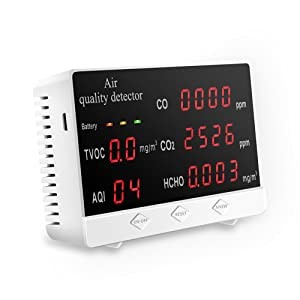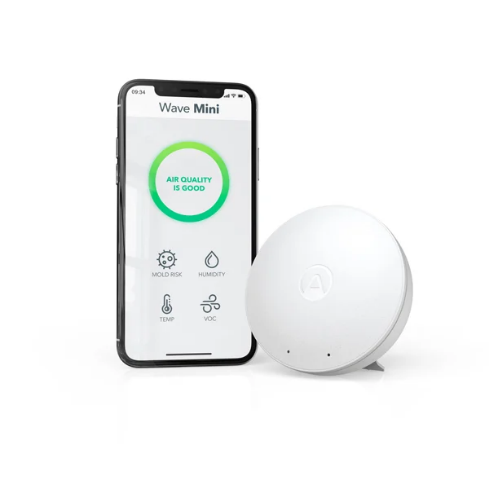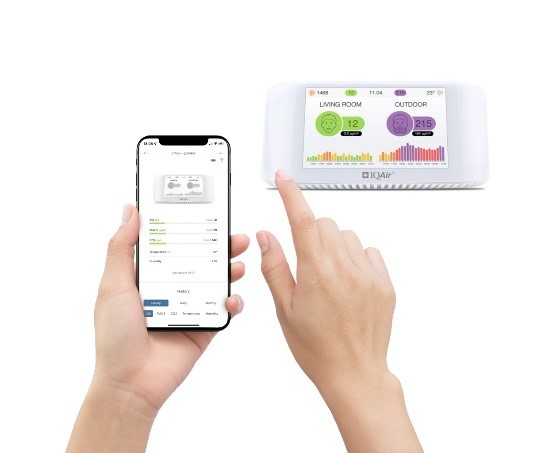Indoor Air Quality Assessments
The quality of the air in your home bears a direct relation to your family’s health. For several decades, indoor air quality (IAQ) has been a prevalent topic, but the recent Covid-19 pandemic emphasized its importance. Airborne pollutants like dust, pet dander, pollen, mold, and various chemical compounds get into our nasal passages and bring on many possible symptoms.
In homes with poor air quality, sneezing, sore throats, and coughs are just a few of the ailments we hear about from our customers. For those with already compromised respiratory systems, like asthma sufferers, these symptoms can quickly go from mildly annoying to potentially deadly.
Many homes suffer from Sick Building Syndrome (SBS), a situation where the air quality has declined to levels where it is a chronic problem. Families living in a home affected by SBS need to address the issues causing the poor IAQ, which may require more frequent dusting and general housekeeping. In cases where large growths of mold and mildew are found to be an issue, complete mold remediation is needed to eliminate SBS.
What Types of Irritants Are in My Air?
When discussing the things in the air of our homes that can cause health-related issues, we refer to two types: particulate matter and chemical irritants.
Particulate Matter: consists of dust, dander, dirt, pollen, or any other solid matter with particles that measure more than 2.5 microns. This solid waste is generated from dead skin cells, mildew, mold, and even pieces of decomposing insects, settling on every flat surface in your home. Installing HEPA filters in HVAC systems will eliminate any airborne matter 3 microns or larger by retaining them in the filter.
Chemical Irritants: also known as Volatile Organic Compounds (VOCs) consist of gaseous by-products emitted by cleaning products, air fresheners, hair sprays, colognes, and any other chemical-based airborne matter. Like lamination glue used to secure wood floors, certain building materials can “off-gas,” releasing chemical irritants during hot or humid weather.
How Do I Know if My IAQ Is Bad?
Indoor air quality (IAQ) is determined to be good or unhealthy based on several criteria that include lack of air movement, too much or too little humidity, and the presence of mold and mildew. Suppose you continually run the air conditioner or furnace without opening your windows. In that case, all that particulate and chemical stuff gets circulated through your home in perpetuity (that means forever). Contrary to what many people believe, your HVAC system does not draw outdoor air into your home. HVAC systems are known as “closed-loop,” which means they treat the same air over and over again.
Invest in an Air Quality Monitor
The easiest way for a homeowner to better understand the quality of the air in their homes is to purchase an Air Quality Monitor. There are several brands and types available, with prices that range from $49 for the most basic unit to just shy of $300.
Basic IAQ Monitor: HEI Liang Air – Multifunction Air Quality Detector

The HEI Liang Air company offers their $49 air quality air tester through Amazon and other online retailers. This small, rectangular unit uses old-school red LED displays (like an alarm clock) and can alert you to the presence of carbon monoxide, formaldehyde, and other VOCs. This air monitor runs on a single 9-volt battery, and you can take it anywhere from home to car to the office, always knowing how clean the air around you is – or isn’t.
Better IAQ Monitor: Airthings Wave Mini IAQ Monitor

Airthings Wave Mini $89 indoor air quality monitor has a look that resembles a Google Mini or Amazon Echo but don’t ask it to play music. The Wave Mini monitors for temperature and humidity, all types of airborne irritants, VOCs, mold, and mildew. The Wave Mini incorporates a smartphone application to interpret the data from the air sensors, showing you a real-time air quality assessment on any device.
Best IAQ Monitor: AirVisual Pro Air Quality Monitor by IQAir

The $299 IQAir Air Visual Pro IAQ Monitor offers everything you need to monitor the air inside and outside your home with its professional-grade laser sensors. The AirVisual Pro detects fine and ultra-fine particulate pollution (PM2.5), CO2, temperature, and relative humidity levels in your environment. It features a bright 5″ color display and has an accompanying app that provides you with air quality alerts. With the AirVisual Pro, you can also view how polluted the outdoor air is and compare it to your own indoor environment.
What Can I Do About the IAQ Of My Home?
Proper ventilation with fresh outdoor air is essential to alleviate symptoms caused by bad indoor air quality. Your home’s air quality can be improved just by opening a few windows for a few minutes every day. Air filters should be inspected regularly and replaced every three-to-six months. Running HVAC equipment with dirty air filters causes the system to work harder to draw in and cool the air in your home.
Other methods that the homeowner can do themselves include vacuuming carpets, floors, and furniture more often. Using a vacuum cleaner with a HEPA filter will keep any dirt and dust picked up by the vacuum from recirculating into your home. Having carpets shampooed regularly can improve air quality by removing dirt and dander attached to your carpet fibers.
For homeowners that want to step up their air quality game, refrain from using any chemical-based cleaning supplies. While using harsh and abrasive chemicals was the only way to thoroughly clean as recently as a decade ago, today, there’s a wide selection of natural and organic cleaning products available. Adding some houseplants to your home, like aloe vera or English ivy, will increase the amount of pure oxygen in your home and help to remove the carbon dioxide we exhale from the air.
Proper Humidity Levels Are Important To IAQ
It isn’t only the presence of dust and dander that can cause poor indoor air quality; the amount of airborne moisture also plays a role in the air’s perceived quality. Environments with too little humidity can dry out skin and sinuses; too much moisture gives the air an oppressive, weighty feel.
Aside from the comfort factor, excessive humidity in your home allows for the growth of mold spores and mildew in vents and ductwork. In rooms that tend to be either too dry or too humid, the use of humidifiers or de-humidifiers may be a solution.
Regular Maintenance of HVAC is Critical for IAQ
It can’t be stressed enough that a regular schedule of HVAC system maintenance will not only extend the life of your system but it improves indoor air quality as well. Having an experienced HVAC technician from Nick’s perform a visual inspection of your residential HVAC system can alert you to problems you may not be aware of. HVAC systems have an average lifespan of ten to fifteen years, but only if adequately maintained. Nick’s HVAC maintenance service will include checking out the following components of your heating and air conditioning systems.
Outdoor AC Components: Visual inspection and observation of the compressor, condenser coils, and expansion valves. The unit is checked for proper refrigeration levels and pressure.
Indoor HVAC Components: Visual inspection and observation of the furnace, heat exchanger, blower motors, thermostats, and evaporator coils.
Ductwork/Vents: HVAC filters will be checked, any visible ductwork will be checked for tears or leaks, and where necessary, replacement or repairs will be recommended.
Call Nick’s Air Conditioning today to schedule an HVAC maintenance service appointment and find out what you can do to improve your home’s IAQ.




